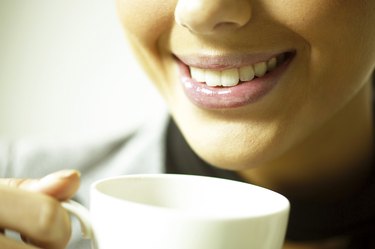
Caffeine is readily available in the American diet. According to Harvard School of Public Health, more than 50 percent of American adults consume coffee daily. Popular coffee and tea franchises seem to be on every block, offering a variety of caffeinated beverages. Stopping for a quick caffeine-packed pick-me-up can provide a boost in your energy levels, but it generally does not cause water retention. In fact, it may do the opposite. Caffeine may, however, interact with certain medications, so consult your doctor before you indulge.
Caffeine is a naturally occurring substance in some plants. It can also be manufactured and artificially added to most foods and beverages. Once caffeine enters your body it is absorbed quickly and sent to your brain. Caffeine has a stimulating effect on your nervous system, which directly effects your metabolism. This is the primary reason you experience a burst of energy when you drink your favorite caffeinated beverage. It may also increase your mental alertness, along with your physical stamina and endurance. Caffeine is used to temporarily treat fatigue and migraines in some people.
Video of the Day
Video of the Day
Water Retention
Your body cannot store caffeine. Up to six hours of after intake, caffeine is excreted from the body through increased urine output. Therefore, caffeine actually helps alleviate water retention because it acts as a diuretic. Caffeine also speeds up thermogenesis, which is a way your body generates heat, so you may perspire more when using caffeine. As with any diuretic, you should consume water during use to avoid dehydration. Caffeine may lead to short-term water-weight loss, but it is not a weight loss solution.
Sources
Caffeine occurs naturally in coffee beans and tea leaves, as well as some nuts such as kola nuts. An 8-ounce cup of brewed coffee supplies 108 milligrams of caffeine. If you want to cut down the amount of caffeine you consume, tea is a good step-down. An 8-ounce cup of tea generally contains approximately 47 milligrams of caffeine and is loaded with antioxidants. Soda provides less caffeine than tea, at approximately 47 milligrams per 12-ounce serving.
Warning
Be aware of your personal tolerance to caffeine. If you exceed your tolerance, you may experience side effects such as feeling jittery, anxious, irritable and nervousness. If you consume caffeine during workouts, particularly in a hot and dry environment, take extra precaution to stay hydrated. Your body will be highly perspiring and extracting high amounts of water from the workout, caffeine and the environment, so you will be at higher risk of dehydration and an electrolyte imbalance. If you feel dehydrated stop use of caffeine and seek immediate medical attention.